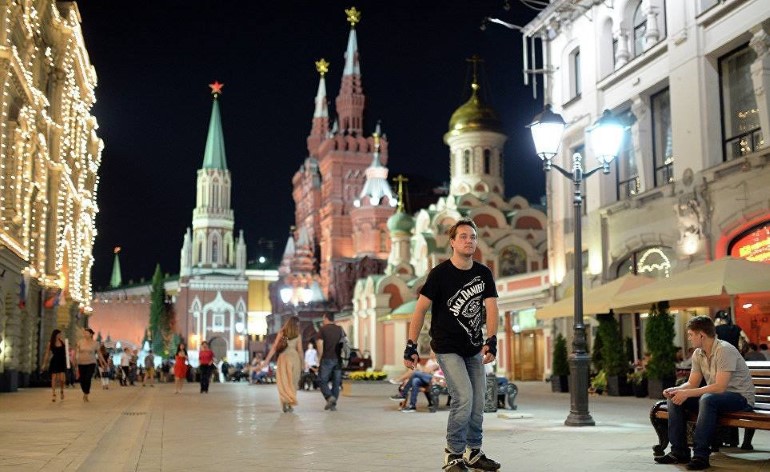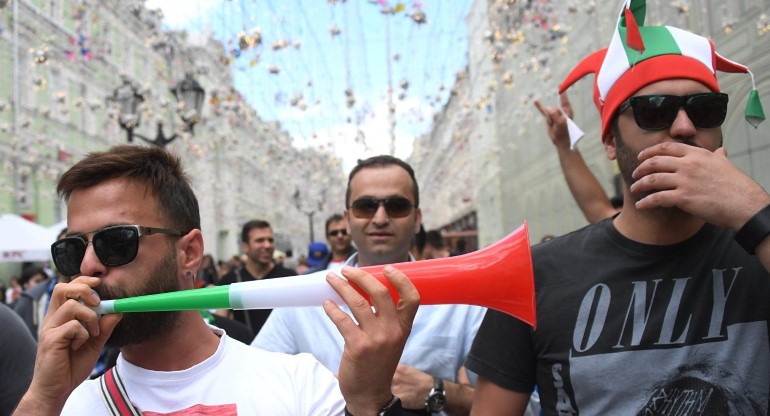Photo: Organisational Committee Russia-2018
Just recently many foreign editions have noted the excellent organization of the FIFA World Cup in Russia. Today they paid attention to the great performance of the Russian team in the debut match with Saudi Arabia. Indeed, we have much to be proud and glad of.
The Norwegian
Aftenposten finds several reasons to that.
New face of Russian cities
First of all, the newspaper notices renewed Russian cities hosting the World Cup, with clean streets, fresh and nicely decorated downtown. “As the result, the Russian capital will become cleaner, more convenient and beautiful than the majority of its European colleagues,” claim the article authors.
Russian railroads made journalists happy. According to them, “trains are always in time”, and the football fans get free tickets.
Talking about the stadiums, Russia has made a breakthrough. Just few years ago only one stadium completely fulfilled matching FIFA requirements. 12 stadiums were built from zero or rebuilt specially for the World Cup. Some of them “make a big impression,” the Norwegians stated.
Mordovia arena – brand new stadium in Saransk. Picture: rg.ru
Without doubts, our prices make foreigners happy. For them, especially Europeans, housing and food in Russia are moderately priced.
The Norwegians mark friendly attitude of Russians. Numerous volunteer corps' members always ready to help the World Cup guests.
And finally on the security. Despite the voiced-out threats form terroristic organizations, Russia works out this issue in the most meticulous way. The streets are peaceful even in the mass populated places. Police officers and other security officials are on the duty 24 hours a day.
Boardwalk in Nizhny Novgorod. Picture: 2018.nnwelcome.ru
The special attention is payed to the Russia's capital where 12 matches are going to be played, including opening and closing games of the FIFA World Cup-2018. According to
The Guardian, Russia's capital has changed more than any European city in the ultimate years. “A dozen flag-waving Moroccans walked through the cavernous interiors of the GUM department store, singing in perfect harmony; a Russian family posed for photographs with a quartet of Mexicans in oversized sombreros behind the domes of St Basil’s Cathedral; and three Peruvians clad in their team’s colours joined thousands of locals strolling around the newly landscaped Zaryadye Park in central Moscow,” - writes the newspaper.
Surveys show that the foreign football fans are happy. They really enjoy the public transportation accessibility, huge variety of coffee shops, bars and restaurants with attractive prices. In all, the city appeals to them. “Some of those visiting may not expect to find a modern metropolis with a pleasant city centre,” admits The Guardian. Assuming that “Stalinist architecture and monuments still give the city an imposing feel,” as a result of renovation the city streets have become “more humane.”
Moscow, Nikolskaya Street. Picture: moscow.carpediem.cd
The capital authorities have done their best to make the stay for fans and tourists as enjoyable and comfortable as possible. 6-languages help application is launched; 5000 taxi drivers went through the free English language training to serve better the World Cup guests.
Smiles instead of insults
The fans are happy for a good reason: impressions from the real Moscow and Russia came well above expectations. Many people keep in mind the following picture from 1990s: dirty streets, shabby walls, poor suspicious folks, minimal infrastructure. Today foreigners are met with smiles and requests for photos instead of expected manifestations of racism and misconduct.
European journalists have their own picture of the world. Politicians of their countries ignore the World Cup. However, the journalists still go to Russia to find out how lives and breathes the “Putin's Russia”; how the civil liberties are being trampled, and what thoughts come to the locals of this “authoritarian country” where surprisingly is possible to schedule a doctor's appointment without paying a bribe. After a short time they
admit that even young people feel pretty free, and many of them support Vladimir Putin with enthusiasm.
Russia is not Brazil
And yet another comparison in our favor: let's remember how bad things were on the past Mundial in Brazil. “Construction works at the Corinthians Arena in São Paulo were still underway just one day before the first match of the FIFA World Cup-2014,” reminds T
urkish newspaper Milliyet.
By the way, there were no negative actions in Russia in the lead-up to the Mundial, unlike multiple protests in Brazil. Instead, the absolute majority of the country's population feels positive and supports the FIFA World Cup hosting.
Fans walk in Moscow. Picture: rsport.ria.ru
Doubtlessly, these factors create the happy vibe. The celebration has expanded into the real people's festival with songs, dance and fairs after our
first victory over Saudi Arabia.
Russians are satisfied with an excellent preparation and conducting the event at a high level. It is very important for Russians to keep cool. Probably the one of the most essential features of our national character is a chance to see and be seen. This time it's not a splurge, we have much to be proud of.
And this feel of the well-deserved celebration is very important. It's known that the general vibe depends on the host's mood. And we feel perfect. Meanwhile even the best preparation wouldn't help if our football team demonstrated boring, uninteresting game. Even the fact that our counterpart wasn't the strongest – does it really matter? Nor are any occasional teams at the World Cup.
Yes, we're not the favorites, but our expectations are not too high. And let the Russian team win the game not for the last time – hence all the championships to be carried out in a great mood!
Russkiy Mir











